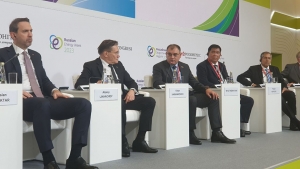Belarus stays committed to low-carbon economy

MOSCOW, 11 October (BelTA) - Belarus is committed to the global trends of low-carbon economy, Belarusian Energy Minister Viktor Karankevich said as he spoke at the international forum Russian Energy Week in Moscow on 11 October, BelTA has learned.
“Belarus follows the global trends of transition to a green economy and low-carbon development,” Viktor Karankevich said. “This is enshrined in the most important program documents, including the energy security concept, the country's sustainable development strategy for the period until 2035,” he said.
In his words, the country's energy complex has a priority task of meeting the needs of the real sector of the economy and the population in energy resources given their maximum efficient use while reducing the burden on the environment. The sector widely implements comprehensive measures to save energy and improve energy efficiency, reduce dependence on hydrocarbon raw materials, and maximize the involvement of local fuels in the fuel and energy balance.
“Special focus is on the implementation of low-carbon technologies, modernization of power grid infrastructure, automation and digitalization of manufacturing processes. In these areas, we cooperate with our partners in the Union State and the Eurasian Economic Union. We are interested not only in the exchange of experience, but also in the implementation of mutually beneficial joint projects,” the minister emphasized.
The Belarusian nuclear power plant (BelNPP) has opened new opportunities for the development of green sectors of the economy. The nuclear power plant, built by Rosatom State Corporation in accordance with the latest safety requirements, occupies an important place in the green agenda of Belarus, Viktor Karankevich said. “The plant helps strengthen the country's energy independence (with the commissioning of the second power unit, the NPP will annually generate about 18.5 billion kWh, which will meet more than 40% of domestic electricity needs), and makes a significant contribution to the common cause of climate change mitigation by reducing greenhouse gas emissions,” the minister said. According to him, since the connection of the first power unit to the unified power grid, the BelNPP has generated more than 20 billion kWh of electricity, which made it possible to replace 5.3 billion cubic meters of natural gas and reduce greenhouse gas emissions by 9 million tonnes.
“The BelNPP has given a powerful impetus to the development of promising green areas and sectors of the economy,” Viktor Karankevich said. “These are energy-intensive industries, construction of multi-apartment and individual electrified housing, use of electricity for heating and hot water supply.”
In his words, much is being done to develop electric transport. The number of electric cars in Belarus is growing year by year following the stimulating measures taken at the level of the head of state and the government, as well as the expansion of charging infrastructure in the country. The number of modern electric buses in cities is expanding. Unique projects are being implemented in Shklov and Zhodino to convert all public transport to electric one.
The forum is underway in Moscow on 11-13 October. This year the event has gathered over 4,000 participants from more than 60 countries and territories. The business program of the forum includes some 30 events. The main theme of the forum is “The new reality of the global energy sector: creating the future”.













